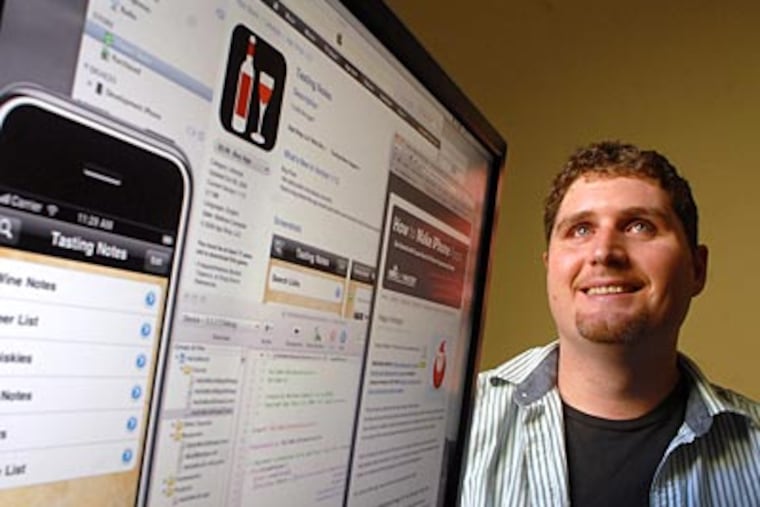
In the fast-moving world of mobile computing, small is all, and apps for BlackBerrys, iPhones, Droids, and other gadgets are the sultans of software.
Which translates into a bonanza of business opportunities for app developers.
App stores had more than $4.2 billion in revenue last year, according to Gartner Inc., which tracks information technology worldwide. Analysts expect that to increase to $29.5 billion by 2013.
"Today's mobile phones are as powerful as many desktop PCs - more so, if you consider that they're also location-aware and have a built-in billing and payment system," said Lisa Allen, a board director of Mobile Monday Mid-Atlantic, the local chapter of a global group that aims to foster education and networking among the mobile-development crowd.
"We're seeing people run their entire lives, even their entire businesses, from their mobile phones," she said.
Apple's introduction last week of the iPad, a 10-inch touch-screen computer sized somewhere between a laptop and an iPhone, is expected to fuel the apps boom still more. Current iPhone apps can be downloaded onto the iPad, and developers are being sought out to build applications for Amazon's Kindle wireless electronic reader, its chief rival.
"Apps offer individual, independent entrepreneurs the ability to own precious real estate on their customers' phones," said Mickey Alam Khan, editor in chief of the online trade publications Mobile Marketer and Mobile Commerce Daily. They "also open up another revenue stream in addition to the Web."
At a recent Mobile Monday Mid-Atlantic gathering at the Cira Centre, Ryan Meinzer eagerly demonstrated mobile-phone programs and seven apps that his company, PlaySay Inc., of Philadelphia, offers for sale for $10 to $30 at Apple's App Store.
Meinzer, 26, created the apps - which teach Chinese, Japanese, and Spanish - in 2008, while working at a Tokyo marketing company. The lessons are a series of digital vocabulary flash cards that include audio pronunciations, a technique called an "enhanced podcast," he said.
The Hershey native moved to Philadelphia over the summer after rejecting San Francisco (too pricey) and New York (too big). Philadelphia was just right, he said, because of its affordability and a vibrant entrepreneurial community he learned about through the group Philly Startup Leaders.
"Everyone I spoke to knew everyone else," he said.
Working more on his own is Matt Campbell, 35, who makes apps and teaches others to do the same in a nearly paperless home office in Langhorne.
In 2008, Campbell was a data analyst for Educational Testing Service in Princeton when he heard Apple was opening the App Store.
" 'I probably could do that as a hobby,' " he remembers thinking to himself.
To build apps for the iPhone and iPod touch, sold exclusively through Apple, a developer must pay $99 yearly to be in the iPhone developer program. Apple must approve an app before it can go into the store, and the developer cedes 30 percent of the revenue to the company.
Campbell's first app, a simpler version of his current Tasting Notes, was for keeping tabs on wine preferences. He revised it to include beer, whiskey, and cigars.
Initially, it cost $4.99, a high price for an App Store download, Campbell said. He reduced it to $2.99 and has earned $10,000 from its sales.
His other apps are Pocket Santa, which tracks Christmas-gift expenditures, and Biz Tippy, which helps the user manage the costs and paperwork of business lunches.
Building an app takes one to three months, Campbell said, with little outlay of cash since he mainly does the work himself.
Last year, he began teaching others to build apps for the iPhone through his Web site (Howtomakeiphoneapps.com), an electronic book he wrote, and a New York company called iPhone Boot Camp, which holds workshops around the country.
Campbell quit his day job in late 2008 (his wife kept hers). Last year, he said, he earned between $50,000 and $60,000.
Some app developers earn big money by luring people into activities they never knew they loved.
In the game Pocket God, for instance, users nurture or torment cartoon islanders. It recently hit two million downloads, making it an app giant.
"I think people want to have a quick joke" and show it to their friends at happy hour, said its programming creator, Dave Castelnuovo, founder of Bolt Creative in San Francisco. That helped him earn $300,000 last year, he said.
"You can have all the right reasons why an app should succeed, but at the end of the day, it really depends on what people like and buy," he said.
This month, Apple announced that 3 billion apps had been downloaded from its App Store from among more than 100,000 titles in categories such as games, business, news, sports, and health. BlackBerry App World has 4,000 titles, and Google's Android Market has 20,000.
Though Apple is dominant now, some industry observers say they think Android will catch up. Its programming language is open source, which means anyone can learn to use and adapt it. Also, there is no approval process: An app for a phone like the Droid can be put on sale in the Android Market with few hurdles.
"Today, they may be the underdog, but in three years they'll be neck and neck," said Rahul Mangharam, an assistant professor of electrical and systems engineering at the University of Pennsylvania.
Penn and other colleges, including Temple University and the New Jersey Institute of Technology, teach students how to create apps on Apple's and Google's platforms.
It's not a frivolous pursuit, Mangharam said: In this tough economy, engineering students and professionals are increasingly looking for untraditional jobs, and some companies are hiring staff to create or enhance a mobile presence.
Graduates "will easily get absorbed into these companies," he said.